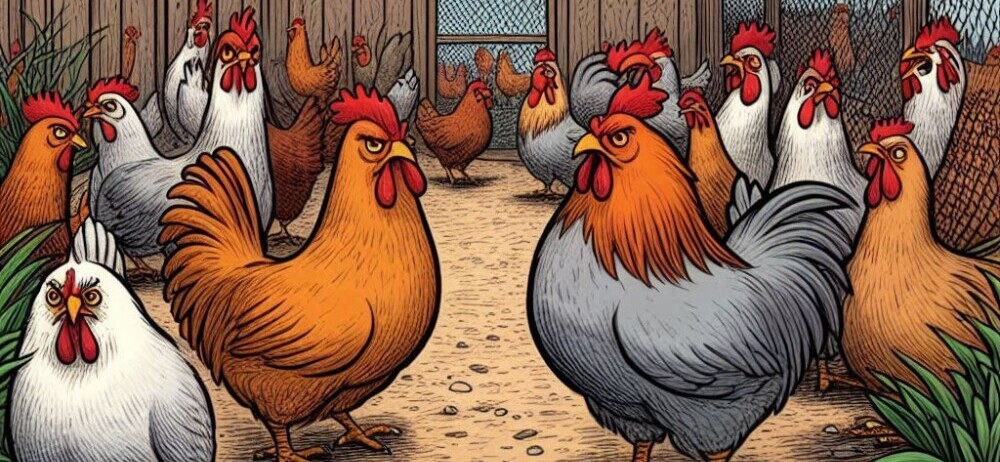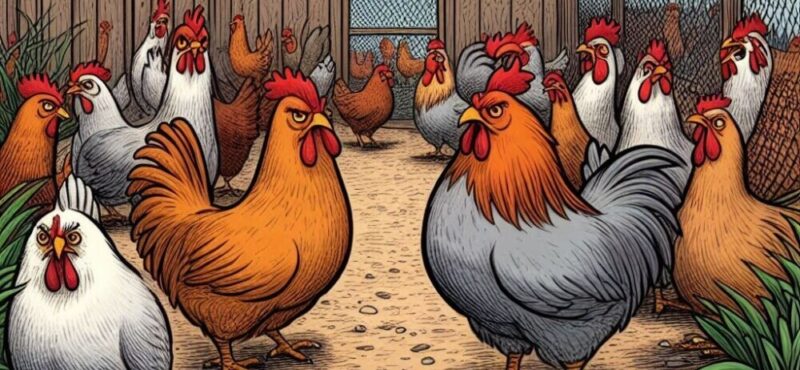
Ever walked into your chicken coop and sensed tension thick enough to cut with a knife? Yeah, aggression among our feathered friends can bring a storm to a peaceful pen. But why does this happen?
Well, chickens have a social structure known as the “pecking order,” which is totally natural. It helps keep things in line. However, issues start when this turns from a simple peck on the head to downright bullying.
Aggression can throw off the balance and harmony of your flock faster than you can say ‘cluck.’
Keeping the peace is key if you want your little feathered pals to thrive together. Just like humans in traffic, chickens want their space and routine. When they don’t get it, feathers fly! Have you ever heard of coop rage?
It’s important to nip these aggressive tendencies in the bud because if left unchecked, they can lead to injury, stress, and a decrease in egg production.
So, how do we start dealing with aggressive chickens effectively? First, know that aggression in chickens isn’t typically about being mean; it’s often about stress or hierarchy-building.
The solution isn’t about making peace overnight, but understanding these behaviors and addressing them wisely. With some pointers and patience, you can create a harmonious environment for everyone in the coop.
Understanding Aggressive Chicken Behavior
So, you’re noticing some squabbling in your coop. Chicken aggression stems from something primal: the need to sort out who’s in charge.
Picture a schoolyard bully but with feathers. Chickens might become aggressive due to various triggers like overcrowding, food scarcity, or even boredom. Imagine if you had nothing to do all day and had to share everything—even your lunch! It’s a surefire way to get on each other’s nerves.
Understanding these root causes is like getting a peek inside a chicken’s brain.
- Overcrowding can make them feel trapped, leading to pecking frenzies.
- Limited food or resources can cause competition, turning even the sweetest hen into a monster.
- Keeping them entertained is key too; bored chickens are often naughty ones.
- And don’t forget illness. A chicken feeling under the weather might lash out just because it’s feeling lousy. I know I don’t ‘sick well’, why would chickens? I know, I know, the hens handle it better…
- Molting can cause the hens to get grumpy at times. Proper nutrition and clean water are important.
To tackle aggressive behavior, it’s crucial to identify these sparks. Make sure your flock isn’t living in cramped quarters, and provide plenty of food and water stations to reduce scuffles. Keep things lively with some chicken-friendly toys or activities. Sometimes, just shaking things up a little can do wonders.
Suspecting an unwell bird? Don’t hesitate to consult a vet. Understanding the why behind chicken dominance and unpredictable squabbles is your best bet in keeping peace and order in the coop.
Types of Chicken Aggression and How to Manage Them
Let’s break it down: Chickens have different kinds of aggression, each with its own flavor of chaos. First up?
Pecking order disputes. It’s their way of maintaining order, but when it turns into harmful pecking, that’s when you’ve got a problem. This kind of aggression is more about establishing who’s boss rather than outright nastiness.
Then there’s food and resource aggression. Competition over food, water, or the best nesting spots can drive chickens bonkers. If you spot some bullying happening around chow time, it’s a clear sign your flock might be getting a bit too competitive.
Rooster aggression deserves its own spotlight. A dominant rooster can turn the coop into his fiefdom, making life hard for hens and other roosters. Understanding why roosters act up—whether it’s hormones or just plain temperament—can help you find ways to mellow them out.
Broody hen aggression is the run-of-the-mill to-be-expecting. Broody hens are chickens with a strong desire to hatch eggs, and they’ll guard their nests fiercely. Handle these girls with care—literal care—using gloves and gentle movements to keep the peace while dealing with their protective instincts.
Each type of aggression needs its own strategy. For instance, addressing pecking order aggression might involve observing interactions and occasionally intervening. For food aggression, try adding more feeding stations so everyone gets fair access. With roosters, sometimes separating them or even rehoming might be the best call.
The main thing is understanding that these types of aggression help you tailor your approach to handling a more harmonious flock. Remember, spreading out resources and giving them their space can go a long way toward dialing down the drama.
Proven Strategies for Dealing with Aggressive Chickens
Lost in the chaos of an aggressive chicken? Let’s talk real solutions that work wonders when feathers start to fly.
Space can be your best friend when it comes to keeping peace. Every chicken needs room to move, forage, and just be. Overcrowding is like a pressure cooker for these birds, so think about giving each chicken adequate coop and run space. It’s like offering them a little piece of their own real estate.
How? Let them free-range, or build a big run. Build a bigger run if needed. Extend the run even more to build a bigger, bigger run. You get the picture. If you don’t want to leave them to their own devices, wait until you are around to let them out.
Got more than one feeder or waterer? Awesome! Having multiple feeding and water stations can drastically reduce the tension around mealtime. It’s like having enough PlayStations so your buddies don’t argue. If food or water becomes a hotspot for fights, spread them out to cool things down.
Keep the boredom at bay with some fun enrichment. Chickens love to peck, scratch, and explore, so introduce dust baths, mirrors, or hanging vegetables to pass the time. Rotate these toys to keep the interest alive, just like Netflix, but for chickens.
Got a real troublemaker? It’s time for a time-out. Isolate overly aggressive hens or roosters temporarily to break the habit and protect others. Think of it as a reset button. Reintroducing them gradually can sometimes curb their aggressive streak.
Don’t overlook the importance of checking out your roosters’ behavior. Evaluate whether their aggression is something manageable or if rehoming is a better call. Sometimes, it’s not them—it’s the dynamics in the flock that need adjusting.
Ahem — sometimes a chicken just has to go if you know what I mean. Culling for the general well-being of the flock can be necessary at times.
These strategies aren’t just about quick fixes—they’re about fostering a long-term, peaceful living arrangement for your flock. Consistency is key, and tweaking these approaches can lead to a happier, more harmonious chicken coop.
Conclusion and Next Steps for Flock Harmony
Keeping aggression under control in your chicken coop can feel like a juggling act, but it’s doable. After going through pecking order dramas and food fights, it’s clear that proactive management is your best ally.
Addressing issues from the get-go and understanding your flock’s dynamics goes a long way in preventing a full-blown chicken showdown.
Remember, patience and observation are key players in this game. Every flock has its unique vibe, and tuning into that can help you address problems before they escalate. Notice the little changes in behavior or mood—that can be your first hint that something’s off.
Sharing experiences with fellow chicken keepers can also help. Whether it’s swapping strategies or just having a good rant about that one rogue rooster, there’s value in community.
Don’t forget to keep learning and adapting your approaches. Chicken keeping isn’t a one-size-fits-all solution; it’s about finding what works best for your tribe. Keep the conversations going and stay curious about new ways to foster a peaceful, productive flock environment.
Stay vigilant – it’s a battle you can win!
Dave

Chickenmethod.com


